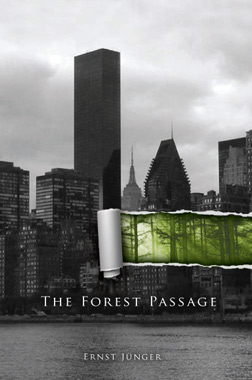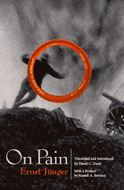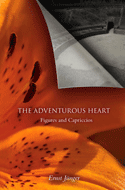 The Forest Passage
The Forest Passage
by Ernst Jünger
Translated by Thomas Friese
Edited and with an Introduction by Russell A. Berman
Telos Press is pleased to announce the publication of Ernst Jünger’s The Forest Passage, now available for purchase in our online store. Expertly translated by Thomas Friese, who previously translated Jünger’s The Adventurous Heart, and with an introduction by Russell A. Berman, this key text from Jünger’s oeuvre is finally accessible to English-language readers.
About The Forest Passage
In The Forest Passage, Jünger explores the possibility of resistance: how the independent thinker can withstand and oppose the power of the omnipresent state. No matter how extensive the technologies of surveillance become, the forest can shelter the rebel, and the rebel can strike back against tyranny. Jünger’s manifesto is a defense of freedom against the pressure to conform to political manipulation and artificial consensus. A response to the European experience under Nazism, Fascism, and Communism, The Forest Passage has lessons equally relevant for today, wherever an imposed uniformity threatens to stifle liberty.
Praise for The Forest Passage
“In a strikingly poetic political statement written soon after the Second World War, Ernst Jünger rejects the two reigning ideologies, democracy and communism, in favor of an individualistic stance anticipating what we now call libertarianism. The ideal that Jünger projects for us is a metaphorical ‘passage through the forest’ in which we remain constantly put to the test, with the result that we emerge self-sufficient, rebellious, heroic.”
—Herbert Lindenberger, Stanford University
“The Forest Rebel says no to power, outwardly unobtrusive but inwardly rebellious and martial, spiritually, politically, and intellectually, an anarch as opposed to an anarchist. Many of the ideas here reflect Germany’s geopolitical situation in the Cold War, powerless against the occupiers of East and West. But the treatise transcends the context in which it was born and manifests Jünger’s sharp analysis of trends and problems that are as relevant today as ever. Particularly in the age of the mass plebiscite called the internet and as the marriage of the state and technology has given government unprecedented power over its citizens, a book about how to resist modern forms of tyranny is timely and much needed.”
—Elliot Neaman, University of San Francisco
“In the Anglophone world the intellectual and writer Ernst Jünger has been overshadowed by the image of the fierce World War I warrior and the radical right-wing ideologue of the 1920s. The result has been an uneven and one-sided public reception that has severely underestimated the significance and complexity of Jünger’s literary oeuvre. Especially his late work has barely been noticed. A critical revision of old approaches is definitely overdue. Therefore the publication of The Forest Passage is a truly important step in the right direction.”
—Peter Uwe Hohendahl, Cornell University
“This fascinating work seeks out a place of inner subjective freedom where the besieged citizen of the modern world may withhold consent and refuse participation in the hellish tyranny of administrative totalitarianism. Jünger invites his reader to become a passenger in this forest of thoughtful reflection beyond the reach of political coercion and conformism.”
—Robert Harrison, Stanford University
Previous Works by Ernst Jünger from Telos Press
 Jünger’s On Pain is an astonishing essay that announces the rise of a new metaphysics of pain in a totalitarian age. Jünger rejects the liberal values of liberty, security, ease, and comfort, and seeks instead the measure of man in the capacity to withstand pain and sacrifice. On Pain heralds the rise of a breed of men who—equipped with an unmatched ability to treat themselves and others in a cold and detached way—become one with new, terrorizing machines of death and destruction in human-guided torpedoes and manned airborne missiles, and whose “peculiarly cruel way of seeing,” resembling the insensitive lens of a camera, anticipates the horrors of World War II.
Jünger’s On Pain is an astonishing essay that announces the rise of a new metaphysics of pain in a totalitarian age. Jünger rejects the liberal values of liberty, security, ease, and comfort, and seeks instead the measure of man in the capacity to withstand pain and sacrifice. On Pain heralds the rise of a breed of men who—equipped with an unmatched ability to treat themselves and others in a cold and detached way—become one with new, terrorizing machines of death and destruction in human-guided torpedoes and manned airborne missiles, and whose “peculiarly cruel way of seeing,” resembling the insensitive lens of a camera, anticipates the horrors of World War II.
 In The Adventurous Heart, Jünger assembles sixty-three short, often surrealistic prose pieces—accounts of dreams, nature observations, biographical vignettes, and critical reflections on culture and society—providing, as he puts it, “small models of another way of seeing things.” Here Jünger experiments with a new method of observation and thinking, which he calls stereoscopy, that unites lucid and precise observation with the unconstrained receptivity of dreams. Finally available in English translation, The Adventurous Heart offers readers a fresh look at one of twentieth-century Germany’s most extraordinary writers.
In The Adventurous Heart, Jünger assembles sixty-three short, often surrealistic prose pieces—accounts of dreams, nature observations, biographical vignettes, and critical reflections on culture and society—providing, as he puts it, “small models of another way of seeing things.” Here Jünger experiments with a new method of observation and thinking, which he calls stereoscopy, that unites lucid and precise observation with the unconstrained receptivity of dreams. Finally available in English translation, The Adventurous Heart offers readers a fresh look at one of twentieth-century Germany’s most extraordinary writers.



